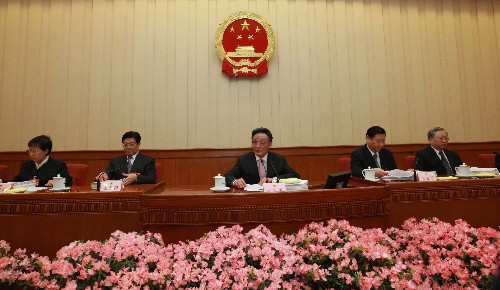The change in the Chinese leadership for a new term of five years was formally initiated in China's Parliament, with a candidate namelist tabled with the Presidium of the First Session of the 11th National People's Congress (NPC) Wednesday afternoon.
Entrusted by the Central Committee of the Communist Party of China (CPC), Xi Jinping, member of the Standing Committee of the Political Bureau of the CPC Central Committee, made explanations to the Presidium on the candidates for the State organs' top positions, including president, top lawmaker and premier.

Chaired by Wu Bangguo, Presidium executive chairman, Wednesday's meeting made a decision that the candidate namelist of the NPC Stand Committee chairperson, vice-chairpersons, secretary-general and members, as well as president and vice-president of the People's Republic of China (PRC) and chairman of the Central Military Commission of the PRC, will be presented to NPC delegations for discussion and consultation.
Xi said the namelist was proposed after a series of democratic recommendations, consultations in and outside the Communist Party of China. Relevant departments were also consulted on the candidates' integrity and performance of duty.
"Electing and appointing leaders of the State for a new term is one of the major tasks for this Session," Xi said. "The CPC Central Committee has set great store by recommendation of candidates for the State organ leaders, and has made an overall consideration when arranging the personnel reshuffle for the 17th CPC National Congress last October."
Besides strict political and professional qualifications, the candidates' personal integrity were also taken into consideration.
The CPC Central Committee has maintained that "after some senior comrades retire, the State organs should be enriched by some younger comrades," Xi said. They should also include women and comrades from ethnic minority groups and other fields, he said.
The candidates should be born after 1940 in general, and the criteria could be relaxed for certain non-Communist party leaders.
Xi extended respect to the "old comrades" who were not nominated this time due to old age, saying that "after contributing to the great cause of the Party and the State, reform and opening up and the socialist modernization drive, they have made fresh contributions this time to the leadership change."
According to China's Constitution, candidates for chairperson, vice-chairpersons, secretary-general, members of the NPC Standing Committee, candidates for president and vice-presidents of the PRC and PRC Central Military Commission, and candidates for president of the Supreme People's Court and procurator-general of the Supreme People's Procuratorate, who were nominated by the CPC Central Committee, will be put for vote by the plenary session of the NPC after consultation with NPC delegations.
The NPC plenary session will decide on the choice of premier of the State Council upon nomination by the President, and on the choice of the vice-premiers and other cabinet members upon nomination by the Premier.
The session will also, upon nomination by the CMC chairman, decide on the choice of all other members of the Commission.
Wu Bangguo, chairman of the 10th NPC Standing Committee, said when he reported the work of the Standing Committee NPC deputies last week that the NPC must conscientiously uphold the leadership of the Communist Party of China to ensure that "the personnel recommended by Party organizations become leaders of the organs of state power through legally stipulated procedures."
(Xinhua News Agency March 13, 2008)